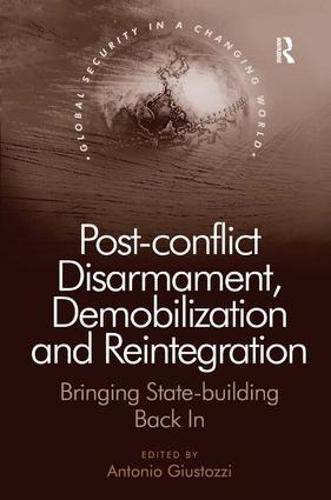Full Product Details
Author: Antonio Giustozzi ,
Professor Nana K. Poku
Publisher: Taylor & Francis Ltd
Imprint: Routledge
Edition: New edition
Dimensions:
Width: 15.60cm
, Height: 1.10cm
, Length: 23.40cm
Weight: 0.460kg
ISBN: 9781409437383
ISBN 10: 1409437388
Pages: 160
Publication Date: 28 April 2012
Audience:
College/higher education
,
Professional and scholarly
,
Undergraduate
,
Postgraduate, Research & Scholarly
Format: Hardback
Publisher's Status: Active
Availability: In Print

This item will be ordered in for you from one of our suppliers. Upon receipt, we will promptly dispatch it out to you. For in store availability, please contact us.
Reviews
'This new edited volume calls attention to the limits of security promotion in war-torn states. In their meticulously researched study, Giustozzi and colleagues underline the mixed record of international efforts to disarm, demobilize and reintegrate former fighters. They show how demobilization and reintegration processes are often connected to the state-building project. In the process, the authors successfully push the boundaries of conventional discourse and practice. They also signal hopeful avenues to sustainably reintegrate soldiers at wars end. Taken together, the volume is an important addition to the critical security studies literature and should be read by scholars and practitioners alike.' Robert Muggah, International Relations Institute, IRI-PUC and Small Arms Survey 'Among the dominant assumptions underlying theory and practice in the field of post-conflict reconstruction is the indispensability of DDR early in the post-conflict period. Indeed the rather rigid model of DDR that has evolved over the past decade has become part of the orthodoxy of UN peace building, part of a sequencing of programs and activities that UN missions rarely deviate from. In recent years, we have seen this orthodoxy increasingly questioned, both in terms of the content of the DDR model and the very utility of the concept to broader processes of peace-building and state-building. This collection of essays edited by Antonio Giustozzi, featuring rich empirical analysis of key DDR case studies, will make an important contribution to that debate and emerging literature. In helping the reader to see DDR not as a discreet standalone reconstruction program, but part of a wider process of state formation, the book should help to catalyze a much needed change of mindset and approach among practitioners and policy-makers alike.' Mark Sedra, Centre for International Governance Innovation (CIGI), Canada
'This new edited volume calls attention to the limits of security promotion in war-torn states. In their meticulously researched study, Giustozzi and colleagues underline the mixed record of international efforts to disarm, demobilize and reintegrate former fighters. They show how demobilization and reintegration processes are often connected to the state-building project. In the process, the authors successfully push the boundaries of conventional discourse and practice. They also signal hopeful avenues to sustainably reintegrate soldiers at wars end. Taken together, the volume is an important addition to the critical security studies literature and should be read by scholars and practitioners alike.' Robert Muggah, International Relations Institute, IRI-PUC and Small Arms Survey 'Among the dominant assumptions underlying theory and practice in the field of post-conflict reconstruction is the indispensability of DDR early in the post-conflict period. Indeed the rather rigid model of DDR that has evolved over the past decade has become part of the orthodoxy of UN peace building, part of a sequencing of programs and activities that UN missions rarely deviate from. In recent years, we have seen this orthodoxy increasingly questioned, both in terms of the content of the DDR model and the very utility of the concept to broader processes of peace-building and state-building. This collection of essays edited by Antonio Giustozzi, featuring rich empirical analysis of key DDR case studies, will make an important contribution to that debate and emerging literature. In helping the reader to see DDR not as a discreet standalone reconstruction program, but part of a wider process of state formation, the book should help to catalyze a much needed change of mindset and approach among practitioners and policy-makers alike.' Mark Sedra, Centre for International Governance Innovation (CIGI), Canada
Author Information
Dr. Antonio Giustozzi is an Associate Research Fellow at the Development Studies Institute at the London School of Economics, UK and a freelance consultant who has worked for the Afghan Analysts Network, the European Union Special Representative's Office in Kabul and the Afghan Research and Evaluation Unit. Anna Mateveeva, Lorenzo Striuli, Antonio Giustozzi, Ben J. Sheperd, Zoe Marriage, Francisco J. Lara Jr, Francisco Gutierrez Sanin, Andrea Gonzalez Pena.




